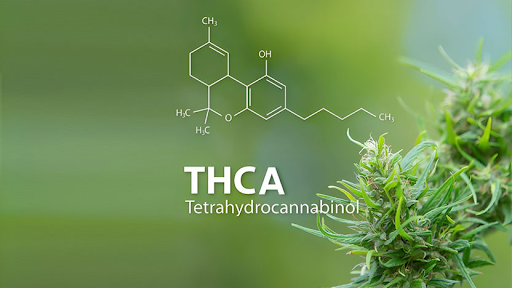Exciting discoveries continue to be made as research into medical marijuana progresses, including new compounds and their potential for therapeutic use. One such compound sparking significant interest is Tetrahydrocannabinolic Acid, also known as THCA.
While THCA doesn’t produce the psychoactive high associated with THC, its infamous cousin, it does possess a wealth of therapeutic properties. These unique qualities may make it an invaluable resource in managing a variety of medical conditions.
In this article, we’ll delve into the potential health benefits of THCA, explain its extraction and preparation process, and highlight the scientific research that supports its therapeutic potential.
Table of Contents
THCA: An Overview
THCA is a non-psychoactive cannabis compound that’s sparking significant interest in the medical world. You might be familiar with THC, the psychoactive compound that gives marijuana its ‘high’. THCA is its precursor, meaning it’s what THC starts out as.
THCA stands for ‘Tetrahydrocannabinolic Acid’. It’s one of the many cannabinoids found in raw cannabis. Unlike THC, THCA doesn’t produce mind-altering effects.
In fact, you could consume a lot of it and you won’t feel high at all. This is because it hasn’t been decarboxylated, a process where it’s heated to activate the psychoactive properties.
But why the interest in a non-psychoactive compound?
THCA is believed to have several therapeutic properties. Research indicates that it may have anti-inflammatory, neuroprotective, and anti-emetic effects. Some even suggest it could have potential in treating epilepsy and other neurological diseases.
However, it’s crucial to note that while these findings are promising, they’re still in the early stages. More research is needed to confirm THCA’s therapeutic benefits and understand how to use it effectively.
Nonetheless, THCA is certainly a compound to keep an eye on. And if you’re looking for a safe way to consume it, start with Secret Nature THCA.
Extraction and Preparation of THCA
Here’s a simplified 3-step process of the extraction and preparation of THCA:
- Raw Material Selection: Start with high-quality cannabis, preferably a strain rich in THCA. Freshness is key because THCA begins to degrade into THC once the plant is harvested.
- Extraction: The extraction process typically involves the use of solvents like alcohol or CO2. The raw cannabis is soaked in the solvent, which binds to the THCA, separating it from the plant matter.
- Purification: Once extracted, the THCA needs to be purified. This usually involves a process of evaporation and filtration to remove unwanted elements.
Therapeutic Properties of THCA
You might be surprised to discover the wide range of therapeutic properties that THCA holds.
To start, it’s known for its anti-inflammatory powers. That means it could potentially help alleviate symptoms of conditions like arthritis, lupus, or Crohn’s disease.
It’s also believed to have neuroprotective qualities. This suggests that it might be beneficial for those suffering from neurodegenerative diseases, such as Parkinson’s and Alzheimer’s.
THCA has also been associated with antiemetic properties, which means it could help with nausea and vomiting. This can be particularly useful for patients undergoing treatments like chemotherapy, which often lead to such side effects.
In addition to these, preliminary findings suggest that THCA might possess anti-proliferative characteristics. In simpler terms, it could potentially help inhibit the growth of cancer cells, although more research is needed to confirm this.
Scientific Research Supporting THCA Benefits
While the array of potential benefits THCA presents is impressive, it’s crucial to examine the scientific research that underpins these claims.
- A study published in the British Journal of Pharmacology found that THCA has neuroprotective effects. This suggests that it could be beneficial for neurodegenerative diseases like Parkinson’s and Alzheimer’s.
- Research in the Journal of Biological Chemistry showed that THCA can have anti-inflammatory properties. This makes it potentially useful for conditions such as arthritis and lupus.
- A 2012 study in the journal PLoS ONE indicated that THCA might help reduce nausea and appetite loss, which could be particularly beneficial for cancer patients undergoing chemotherapy.
Potential Risks and Side Effects of THCA
While research on THCA is still in its early stages, some preliminary studies suggest that it’s generally safe, but like any substance, it’s not without potential risks.
One possible concern is how THCA interacts with other substances, particularly medications. It’s possible that THCA could interfere with the effectiveness of certain drugs, or increase the risk of side effects.
That’s why it’s crucial to speak to your doctor before starting any new supplement or treatment, including THCA.
Another potential issue is the risk of contamination. THCA is derived from cannabis plants, which can absorb toxins from the soil. If the plants aren’t grown in a clean environment, the THCA they produce could be contaminated with harmful substances.
While THCA doesn’t produce the ‘high’ associated with THC, it can convert into THC when exposed to heat. This could potentially lead to unintended psychoactive effects if you’re not careful about how you store and use it.
It’s important to understand these potential risks and make informed decisions about your health.
Conclusion
Although research into THCA is still in its infancy, it’s already showing great promise as a potential treatment for a wide range of health conditions.
From its potential anti-inflammatory and neuroprotective properties to its possible ability to curb nausea and vomiting, the therapeutic potential of THCA is certainly vast.
However, it’s important to proceed with caution. Make sure you’re informed about any potential side effects and interactions, especially if you’re taking other medications concurrently.
Lastly, it’s always wise to consult with your healthcare provider before starting a new treatment regime.





